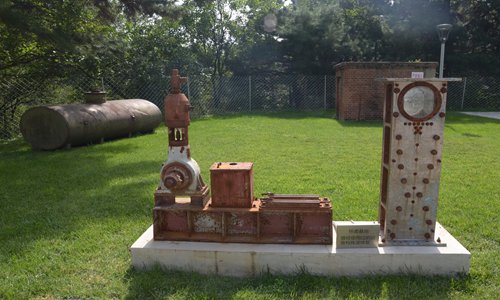HOME >> CHINA
People hail "Two Bombs, One Satellite" founders for inspiring generations of Chinese scientists
By Yang Sheng Source:Global Times Published: 2019/10/16 22:08:40
Spirit of scientists encourages generations of Chinese researchers: expert

Pictured is the memorial hall of the Chinese Academy of Sciences and the museum of "Two Bombs and One Satellite" in Beijing on September 23, 2017. Photo: VCG
Chinese people saluted scientists on social media who had contributed to the development of nuclear weapons and missiles on Wednesday, as the day marked the 55th anniversary of China's successful first nuclear test, or the explosion of first atomic bomb, on October 16, 1964.
China developed nuclear bombs, an intercontinental ballistic missile (ICBM) and an artificial satellite in 1956 in a project called "Two Bombs, One Satellite." "Two Bombs" refers to the atomic bomb (and later the hydrogen bomb) and the ICBM, while "One Satellite" refers to the artificial satellite.
Observers noted that the "Two Bombs, One Satellite" was extremely crucial to China and its people since it laid the foundation for the nation to respond to nuclear blackmail from the US after the Korean War, and also freed itself from security reliance on the Soviet Union, which allowed the People's Republic of China (PRC) to prevent direct wars with other major powers, realize true independence in the international arena and become a major international influence.
On China's Twitter-like social media Sina Weibo, the topic "55th anniversary of China's successful atomic bomb explosion" has been viewed 130 million times and "Salute to founding father of Two Bombs, One Satellite" received 86.7 million views.
The 23 founding fathers of the project were awarded the Two Bombs and One Satellite Merit Award in 1999, including Deng Jiaxian, Qian Xuesen, Yu Min, Guo Yonghuai and Cheng Kaijia. Only three scientists, Sun Jiadong, 90, Wang Xiji, 98, and Zhou Guangzhao, 91, are still alive. Sun was also awarded the Medal of the Republic on September 29, two days ahead of the 70th anniversary of the founding of the People's Republic of China.
Many of those scientists abandoned their stable lives in Western countries in the 1950s-1960s, and returned to China under the risk of investigation and persecution by the US and its allies, and most of them had to conceal their identities and sacrificed their personal happiness and freedom. They only had one purpose - to make China a nuclear-powered country able to protect its people from imperialism and hegemony, said a military expert and retried People's Liberation Army senior officer at a Beijing-based military academy who requested anonymity.
My People, My Country, a domestically-produced film shown to celebrate the 70th anniversary of the founding of the PRC, with box office of 256 million yuan also included a story of a young scientist who suffered from radiation due to an accident in the nuclear reactor. He met his lover accidentally while receiving medical treatment in Beijing.
"The spirit has encouraged all generations of Chinese scientists, especially those serving in the country's national defense and military development. Fortunately, their sacrifice has allowed us to showcase our achievements to the people and the world, to prove we are able to safeguard not only China but world peace as well," the anonymous expert said.
China's most advanced ICBM, the DF-41, made its debut at the National Day parade in Beijing on October 1, which Yang Chengjun, a Chinese expert on missile technology and nuclear strategy and chief scientist of quantum defense, said is a message to the world that China has sufficient and reliable strategic nuclear power to respond to any "nuclear blackmail" from any country.
Newspaper headline: ‘Two Bombs, One Satellite’ founders hailed
Posted in: SOCIETY